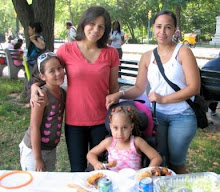Are you (or someone you know) looking for something productive for your teenager to do this summer? If you need ideas to fill up their free time and keep them busy, here are a few places that are offering internships and/or training for young adults this summer:
The Bronx: YAIP (Young Adult Internship Program) a paid internship for three months that includes work readiness and support services to young adults 16-24. For More Info Visit www.bronxworks.org
Brooklyn: OBT (Opportunities for a Better Tomorrow) Provides on-the-job training/apprenticeship for urban youth in two locations in Brooklyn. For More Info Visit www.obtjobs.org
Manhattan: Year Up provides 6 months of training and a corporate apprenticeship for 18-24 with their High School/GED. For More Info Visit: www.yearup.org
Queens: Elmcor Youth & Adults Activities, Inc. provides various vocational and educational services to young people. For More Info Visit: www.elmcor.org or www.eec.sunyeoc.org
Staten Island/Manhattan: The Way to Work, Inc. provides extensive trainings, internships, and job placement services to young people 17-21. For More Info Visit: www.thewaytoworknyc.org
For New York City-Wide (DYCD's) Programs that connect Urban Youth click on the links below:
Summer Youth Employment Program (SYEP)
A seven-week summer employment initiative open to young people between the ages of 14 and 24. Participants work up to 25 hours a week while earning $7.25 per hour in assignments that include government agencies, hospitals, summer camps, nonprofits, small businesses, and retailers. The application process begins April.
NYC Ladders for Leaders
An innovative program that offers high school and college students the opportunity to participate in summer internships with some of the most dynamic corporations and businesses in New York City.
Young Adult Internship Program
As part of Mayor Bloomberg's Commission for Economic Opportunity, DYCD is providing the most job-ready disconnected youth with short-term paid internships, job placements, and follow-up services.
In-School Youth (ISY) Program
Provides occupational skills, employment services, and educational opportunities to low-income high school juniors and seniors.
Out-of-School Youth (OSY) Program
Provides extensive job training and employment services to 16-21 year-olds who are not enrolled in school.
Tuesday, May 31, 2011
Wednesday, May 18, 2011
Map of Tomorrow
The face of America is changing.
By 2042, the nation will be a majority people of color.This decade, the majority of young people will be people of color.
From Southern California to rural Iowa, every corner of America is seeing these changes.
What does this map say about the future of America?
To see how we'll get here visit America's Tomorrow from PolicyLink.
Tuesday, May 3, 2011
Mother's Day Success Story: Dilia Mieses
This year for Mother's Day we're featuring Dilia Marina Mieses Mendez, in recognition of her fighting spirit, and as a symbol of all the mother's that struggle to overcome obstacles and care for their children with special needs.
Dilia, who recently became a member of Sinergia's Board of Directors, had a blossoming career in her native Dominican Republic. After graduating from civil engineering, she decided to pursue classical ballet, which was her passion. She trained as a dancer as well as an instructor, and received a diploma from the Royal Academy of Dance in New York. Ms. Mieses later headed up a private dance school back home, became academic director of the National Dance School of Santo Domingo and was one of the founders of the Instituto Superior de Bellas Artes, the first organization focused in fine arts in the capital city. Armed with the self confidence that being a leader had fostered in her, she enrolled in a Master's Program for teaching. It seemed as if nothing could stop this mother of two, but in 2004, her world was turned upside down. Her youngest son, four year old Cesar, was diagnosed with autism. She traveled to the States to get a second opinion, and attended a training program for parents of children with autism. Upon returning home she tried to juggle her new circumstances, but there were few resources available locally, and after 2 years she realized she needed to find better care for her child elsewhere. Leaving behind her career in dance -- and her husband -- in 2007 she came to New York in search of assistance. Since then she has been confronting obstacles every day, but she has dedicated herself to learning about autism and the educational system to help out little Cesar. She credits her mother as being instrumental in her fight.
"When there is a child with special needs all the people around them play a very important role. I am very thankful of my family because without them I could not be here. My mother has been a huge support. She helped to pave the way for me. I could not have done it by myself. It takes a lot of effort to get children with special needs to calm down, and sometimes it feels like the days aren't long enough."
"My child requires attention all day long and the quality of care from parents and family members cannot be compared to those of an outside worker, unless you're lucky to find a special one. That makes the child feel secure, which helps him overcome obstacles. I am happy to be dedicating myself to my two sons, and even though I have sacrificed a career that gave much joy, I feel good."
Rusk Institute's Glass Garden to Shut Down
It's Spring, and for gardeners, this means planting season! To get geared up, Erin McSorley, Day Habilitation Specialist at Sinergia, recently attended a gardener's club meeting, where she met Gwen Fried, a horticultural therapist at the Rusk Institute of Rehabilitation Medicine at NYU Medical Center.
She told Erin all about the Institute and their Glass Garden, a 1,700
square-foot conservatory that was built in 1959, the first facility of
its kind to be fully accessible to people using wheelchairs.
The garden also includes around 15,000 square feet of outdoor garden space that includes a children's PlayGarden and perennial flowers.
Aside from being a beautiful public space (open seven days a week), the
Glass Garden functions as a rehabilitation and education center. They
have a wide variety of programs available ranging from preschool nature
classes to cardiac rehabilitation to therapy for individuals with
Alzheimer's disease, HIV/AIDS, brain injury, epilepsy, and mental illness. Sinergia's Day Habilitation
has plans to visit the Glass Garden very soon and investigate what we
might learn through the prevocational training offered there.
Unfortunately, Glass Garden's
days are numbered. NYU has plans to bulldoze the area to make room for a
new research center. While Gwen and her associates at the Rusk
Institute can't do much to fight these changes, there are friends of the
garden working hard to gain support to either save or rebuild the
greenhouse and gardens. You can show your support for the Rusk Institute
and Glass Garden by writing to Mark Thompson,
chairman of Community Board 6, and urging him to do what he can to
preserve this special place. You can also contact Erin McSorley, 212-643-2840 ext. 343
for copies of a pre-written letter to sign or a list of additional
people in office to contact.Visit the Glass Garden as soon as you can,
and to check out their programs and calendar of events go to www.med.nyu.edu/rusk/glassgardens.
Speak Out on Services for Children with Special Needs
On April 12, the MPC co-sponsored a Speak-Out
event along with the ARISE coalition. The Speak Out, or ¡Hablando Claro! in Spanish, was an opportunity for parents
of children with special education needs to voice their concerns with
the provision of special education services before elected officials,
the Department of Education and key stakeholders. The event was
attended by a diverse parent population who don not often get a chance to speak. In repeated instances, and many trying to
withhold long pent-up emotions, the parents reported feeling anguish over their
child not having made progress after years of special education
services. Others described being treated with disrespect by school staff
and/or their child refusing to go to school. One parent told of her son
having been in District 75 since the age of 8, when he was classified as
emotionally disturbed. She was repeatedly called to pick up her child
due to his disruptive behavior and asked to increase his medication. Now 17
years of age, he is still in District 75 with the ED classification,
despite having matured and his behavior calmed. When the parent sought a
reclassification and move to a community school, to her dismay the school
psychologist suggested re-classifying her son as mentally retarded and placing him in a
12:1:4 program (a program for multiply disabled), stating that this way
she could continue getting SSI services. Sinergia and the MPC laud the
courage and perseverance of the parents who poured their hearts out in
testimony and shared their challenging experiences in trying to secure
special education services for their children.
NYC Public Advocate Bill DeBlasio made an appearance and heard the parent's stories. Stating that he was very concerned about the issues with special education, the Public Advocate announced that his Office was conducting a survey which parents were invited to complete. The surveys are being collected through the month of May, after which their outcomes will be reported and published.
NYC Public Advocate Bill DeBlasio made an appearance and heard the parent's stories. Stating that he was very concerned about the issues with special education, the Public Advocate announced that his Office was conducting a survey which parents were invited to complete. The surveys are being collected through the month of May, after which their outcomes will be reported and published.
Subscribe to:
Comments (Atom)














